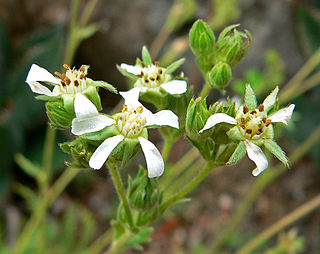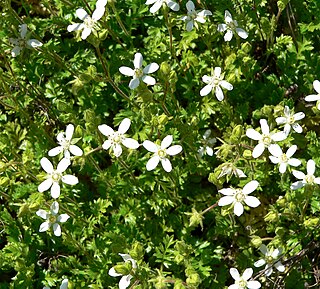Potentilla bolanderi, also known as border horkelia and Bolander's horkelia, is a rare species of flowering plant in the family Rosaceae. It is endemic to northern California where it is known from only a few occurrences in two or three counties. It grows in the mountain forests of the North Coast Ranges.

Potentilla californica, also known as California horkelia, is a species of flowering plant in the rose family.

Potentilla clevelandii, also known as Cleveland's horkelia, is a species of flowering plant in the rose family. It is native to the Peninsular Ranges of southern California and northern Baja California.

Potentilla lindleyi, commonly known as wedgeleaf horkelia, is a species of flowering plant in the rose family. It is endemic to California, where it grows in coastal chaparral communities and sandy areas.

Potentilla daucifolia, commonly known as carrotleaf horkelia, is a species of flowering plant in the rose family. It is native to the Klamath Mountains and surrounding ranges in northern California and southern Oregon. It grows on mountain slopes and fields, often on serpentine soils.

Potentilla marinensis, commonly known as Point Reyes horkelia, is a rare species of flowering plant in the rose family. It is endemic to the California coastline, where it is known from about Fort Bragg to near Santa Cruz. It grows on beaches and in other sandy coastal areas.

Potentilla parryi, commonly known as Parry's horkelia, is a species of flowering plant in the rose family. It is endemic to California, where it grows in the chaparral of the Sierra Nevada foothills.

Potentilla sericata, commonly known as silky horkelia, is a species of flowering plant in the rose family. It is native to the Klamath Mountains of northern California and southern Oregon, where it grows in the chaparral and forest, often on serpentine soils.
Potentilla tilingii, commonly known as threetooth horkelia, is a species of flowering plant in the rose family. It is native to all of the mountain ranges of northern California and southern Oregon, where it grows in coniferous forest.
Potentilla truncata, commonly known as Ramona horkelia, is a species of flowering plant in the rose family. It is native to the Peninsular Ranges of southern California and northern Baja California, where it grows in the chaparral.
Potentilla tularensis, commonly known as Kern Plateau horkelia, is a species of flowering plant in the rose family. It is endemic to Tulare County, California, where it is known from about ten occurrences in the High Sierra Nevada. It grows in rocky, exposed areas.
Potentilla argyrocoma, commonly known as silverhair mousetail, is a species of flowering plant in the rose family. It is native to the San Bernardino Mountains of southwestern San Bernardino County, California. A population of Potentilla argyrocoma is also found in Baja California in Mexico; this population may or may not be distinct and further study is required.

Astragalus kentrophyta is a species of milkvetch known by the common name spiny milkvetch. It is native to western North America from central to west Canada, to California, to New Mexico. It grows in rocky mountainous areas, such as the Sierra Nevada, and on plateaus.

Potentilla hendersonii, commonly known as Henderson's horkelia, is a rare species of flowering plant in the rose family. It is known from four populations in southern Oregon, including Mount Ashland, and one population south of the border in Siskiyou County, California. It is a resident of dry forest habitat in the granite soils of the Klamath Mountains.

Potentilla hispidula, commonly known as White Mountains horkelia, is a species of flowering plant in the rose family. It is endemic to the White Mountains, a small range of mountains that straddles the border between California and Nevada east of the Sierra Nevada. It is a resident of dry scrub and alpine and subalpine forest habitat.

Potentilla rydbergii, commonly known as Rydberg's horkelia, is a species of flowering plant in the rose family. It is endemic to the Transverse Ranges of southern California, where it grows in several types of habitat, including pine forest.

Potentilla micheneri is a species of flowering plant in the rose family. It is known by the common names Santa Rosa oceanspray, Santa Rosa horkelia and thin-lobed horkelia and is endemic to California, where it is known only from the coastal hills and mountains north of the San Francisco Bay Area. It is a plant of chaparral habitat.
Potentilla wilderae, commonly known as Barton Flats horkelia, is a rare species of flowering plant in the rose family. It is endemic to San Bernardino County, California, where it is known from only about ten occurrences in the vicinity of Barton Flats. It grows in the montane chaparral and woodlands habitat where chaparral meets pine forest, and it is threatened by logging.

Silene douglasii is a species of flowering plant in the family Caryophyllaceae known by the common name Douglas's catchfly.

Drymocallis glandulosa, formerly Potentilla glandulosa, known by the common names Douglas' wood beauty and sticky cinquefoil, is a plant species in the family Rosaceae.















